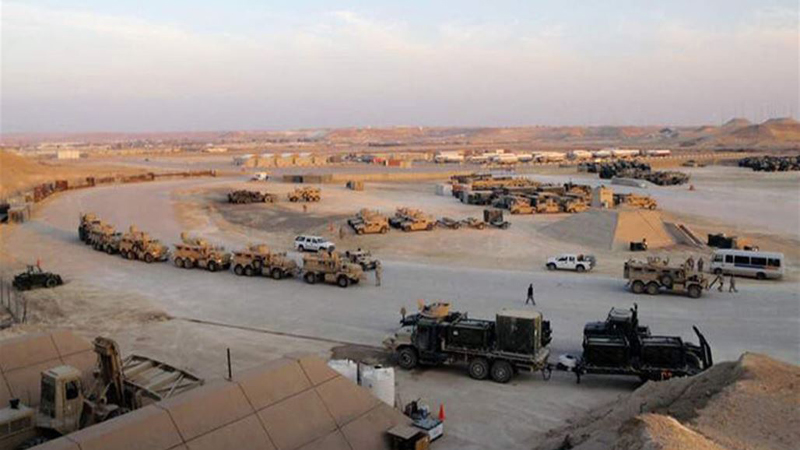What is the fate of “Ain al-Assad” and “Harir” after the withdrawal of US forces from Iraq?
What is the fate of “Ain al-Assad” and “Harir” after the withdrawal of US forces from Iraq?
2021-12-11 06:38
 Shafaq News/ Two Iraqi security officials said today, Saturday, that the process of withdrawing combat forces from the international coalition units led by the United States will not affect the status of the “Ain al-Assad” bases in Anbar Governorate, western Iraq, and “Harir” in Erbil in the Kurdistan Region.
Shafaq News/ Two Iraqi security officials said today, Saturday, that the process of withdrawing combat forces from the international coalition units led by the United States will not affect the status of the “Ain al-Assad” bases in Anbar Governorate, western Iraq, and “Harir” in Erbil in the Kurdistan Region.
On Thursday, the ninth of this month, the Iraqi authorities announced, “officially”, the end of the combat missions of the international coalition forces in Iraq, and their withdrawal from the country about 7 years after the formation of the international coalition for the war on terrorism, after the “ISIS” organization invaded large areas of northern Iraq. and west of the country in 2014.
A senior Iraqi security official in Anbar told Shafaq News Agency, that work in “the two bases of Ain al-Assad, Anbar Governorate, and Harir, in Erbil, will continue within the framework of support and training for the Iraqi forces, according to the outcomes of the fourth round of dialogue held at the end of last July between Prime Minister Mustafa Al-Kazemi.” US President Joe Biden.
The security official explained, “Any plans to close Ain al-Assad or evacuate it from the coalition’s activities are out of the question, as the base is an important base for air support operations, information analysis, and providing Iraqi forces with the necessary and important advice in the war on the remnants of ISIS.”
While another official told Shafaq News Agency, “The fortified base, (located in the town of Al-Baghdadi, 90 km west of Ramadi), still contains the Patriot system,” adding that “the task of the Iraqi forces will be to protect the base completely, according to the agreement, because the forces The rest is advisory, not combative.
He pointed out, “Al-Qaeda is under the overall control of the Iraqi Operations Command, meaning that the part where the coalition forces are located is among the total base in which the Seventh Division of the Iraqi Army is deployed.”
While the director of Al-Baghdadi district, Sharhabeel Al-Obaidi, told Shafaq News Agency, “The members of the coalition forces present at Ain Al-Assad base are advisory elements only, and they work on training and arming the Iraqi army forces, as well as preparing plans for operations to eliminate ISIS in Anbar, and there are no There are coalition combat forces there.
Al-Obaidi added to Shafaq News Agency, “At the time when the coalition forces entered a base to support the Iraqi forces in the war against ISIS, their number did not exceed a thousand, and although we are sure that there is no such number inside the base now, we have not seen a withdrawal.” Any element of them, on the ground.”
He stressed, by saying, “The last time we saw the coalition forces, it was more than six months ago, since they withdrew their positions on the Iraqi-Syrian border, more than six months ago, to join those with them inside the Ain Al-Assad base, where they entered at that time with more than 70 vehicles. “.
A security official in the district confirmed that “the coalition forces present at al-Qaeda have, about two months ago, laid off the majority of Iraqi workers and contractors, although they had previously worked there after obtaining the approval of the Joint Operations Command.”
And he indicated that “there are very few Iraqi workers left at the base, so they are not allowed to enter the base, and their work is limited to rehabilitating and maintaining the areas surrounding the base.”
A senior local official in Al-Qaim district, west of Anbar and the border with Syria, says that “in the event that the coalition forces actually withdraw, positive and negative things will be left behind by the withdrawal process.”
He explained to Shafaq News Agency, “One of the most important advantages of the withdrawal of the coalition forces is to get rid of the terror of missiles and drones exchanged between the coalition and the pro-Iranian factions, which frightens the population there, and this is what prompted many families to migrate to their areas.”
And Wednesday (December 8, 2012), US President Joe Biden said that there will be no US forces conducting combat missions in Iraq after December 31, 2021.
Earlier, the Iraqi Joint Operations Command confirmed that there was no intention to postpone the date of the withdrawal of US combat forces from the country.
Iraq and the United States agreed last July to withdraw all American combat forces from Iraq by the end of this year.
Armed Shiite factions threaten to launch “decisive battles” on the night of the 31st of next month if US forces do not withdraw from the country they entered in 2003.
shafaq.com
